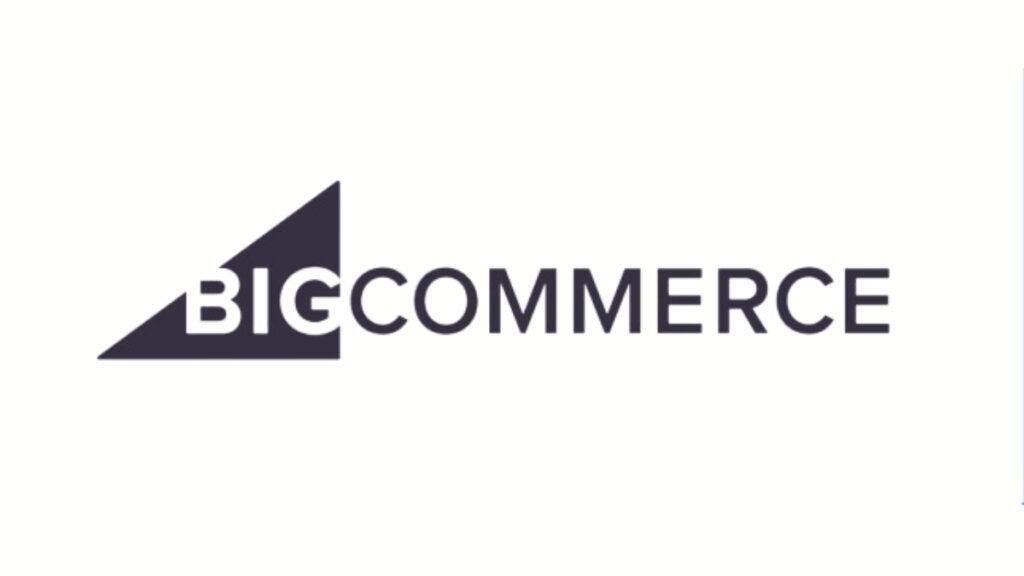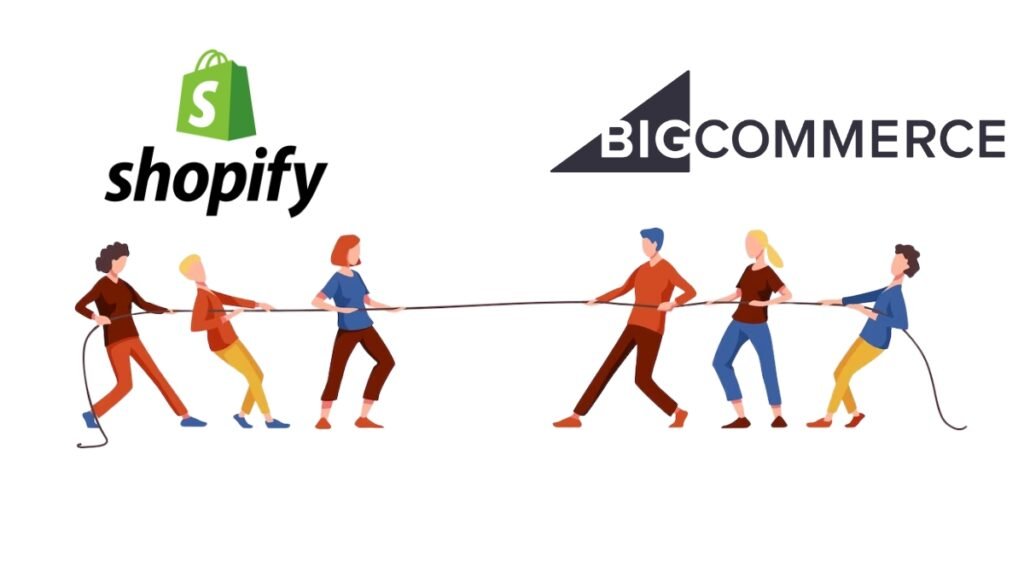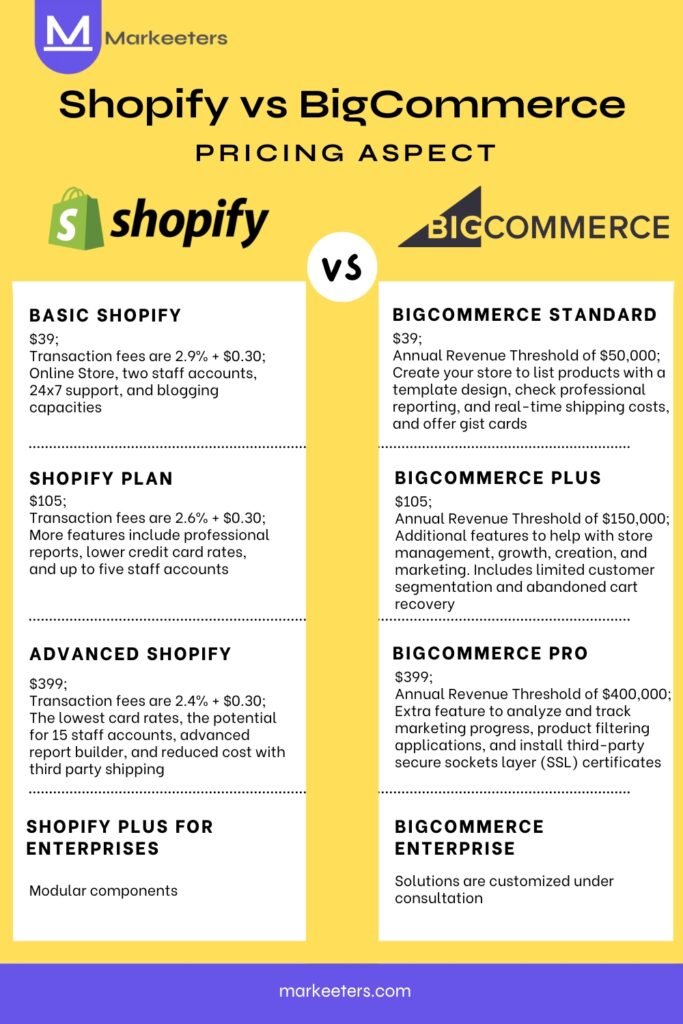Compare Shopify vs BigCommerce for your online store in 2024! Find the best e-commerce platform with our simple guide. Make the right choice today!
Since the arrival of online shopping and the internet boom, e-commerce has experienced tremendous development. Customers are making more and more purchases online rather than at conventional physical showrooms and shops. They are getting more accustomed to using e-commerce sites. This rise has helped develop strong e-commerce systems that facilitate the sale of products, inventory management, and a positive customer experience for online retailers.
Shopify and BigCommerce are two of the most effective e-commerce systems available today. With just one website, they make it simpler for anybody to start, grow, promote, and run a very successful business. These two e-commerce competitors host tens of thousands of online businesses, representing billions of dollars in revenue. Both platforms are user-friendly for beginners, come with several basic features, and have mobile-friendly, responsive layouts.
Let’s study the two most popular e-commerce platforms and help you understand which suits your business.
What is Shopify?

With more than 4.1 million active businesses, Shopify is the most widely used e-commerce platform. It was created in 2006. It provides a number of tools to help manage your online business. Some important features include:
- Customizing a website and theme
- Tools for marketing
- Content management
- Payments processing
- Options for shipping
- Integrations with social media platforms
- And more
Shopify also provides dozens of different applications in its own app store to help you improve the functionality of your business.
Similar resources for your:
- 10 Best Shopify Stores to Inspire You in 2024
- WooCommerce vs Shopify: Better E-Commerce Platform 2024
- Magento vs Shopify: Which E-commerce Platform is Best for You?
What is BigCommerce?
BigCommerce, a top cloud-based e-commerce platform, is ideal for both existing and rapidly expanding companies. BigCommerce combines industry-leading performance, open design, and an app ecosystem with corporate capabilities to help organizations maximize online sales in 80% less time, money, and effort than on-premise software. BigCommerce was established in 2009, and approximately 50,000 online shops use it.

Features include:
- SEO and analytics optimization
- Payment and inventory management
- Website customization
- App integration
- Multi-language
Pros and Cons
| Pros | Cons |
|---|---|
| – Wide array of integrated e-commerce features | – The free themes are very similar |
| – Excellent features for several currencies | – The drag-and-drop editor needs to be improved |
| – Allows you to create several stores using a single account | – Restrictions on yearly sales |
| – All plans include real-time shipping quotes from third parties | – There are not many fonts available |
Shopify vs BigCommerce: A Quick Review
| Feature | Shopify | BigCommerce |
|---|---|---|
| Pricing | Monthly subscription plans with transaction fees | Monthly subscription plans with no transaction fees |
| Ease of Use | User-friendly interface with a simple setup | Intuitive interface with a bit steeper learning curve |
| Customization Options | Extensive app store for added functionalities | In-built features for in-depth customization |
| Transaction Fees | Varies based on the plan and payment gateway | No additional transaction fees on top of plan costs |
| Payment Gateways | Supports numerous third-party gateways | Offers a variety of built-in payment gateways |
| Themes and Templates | Wide selection with paid and free options | High-quality templates with fewer free options |
| SEO Capabilities | Strong SEO features and customization options | Robust SEO tools for optimizing online visibility |
| Scalability | Scales well for small to large businesses | Suitable for businesses of all sizes and scales |
| Customer Support | 24×7 support via chat, email, and phone | 24×7 support through various channels |
| Mobile Responsiveness | Mobile-responsive design for online stores | Mobile-friendly design for seamless shopping experience |
| POS Integration | Offers a built-in Point of Sale system | Integrates with leading POS systems for retail |
Shopify vs BigCommerce: A Detailed Comparison

We have laid down essential aspects of Shopify and BigCommerce that every business should be aware of in order to help you decide which platform is best for you. From price to SEO, analytics to applications, customer service, and e-commerce tools, we will cover it all:
Shopify vs BigCommerce: Ease of Use
Both systems include a ton of functionality, a sleek website editor, and an updated interface. Although their dashboards are loaded with useful tools and advice, it could take some time to become familiar with them.
Using templates instead of typical page editing is how the Shopify editor builds websites. Regular retailers without any technical experience can quickly build a basic store. Shopify simplifies e-commerce operations such as payment processing and inventory management.
BigCommerce is less appropriate for beginners, although it is targeted for business owners without prior web development expertise. Developing a BigCommerce online shop involves more technical aspects than developing one with Shopify. It needs more time and work. The platform offers various built-in capabilities from the lowest plan levels, which saves time, unlike Shopify.
| Shopify is a top option for businesses starting their first online store since it is simple to use. Experienced users can get the most out of BigCommerce’s built-in capabilities. |
Shopify vs BigCommerce: Pricing
These e-commerce platforms have subscription-based pricing structures, which are surprisingly comparable. For many businesses, this is one of the most important elements. Shopify and BigCommerce both have three price tiers with discounts of up to 10% for yearly subscriptions.

| Overall, the pricing of Shopify and BigCommerce appears to be evenly balanced. |
Shopify vs BigCommerce: Transaction Costs
The portion of each sale that an e-commerce platform keeps for itself is known as transaction fees. It is an important aspect of creating a long-lasting company.
Shopify credit card fees range from 2.4% to 2.9% for US-based merchants utilizing Shopify Payments. Purchases made with PayPal Express, Shopify Payments, Shop Pay, and Shop Pay installments are exempt from third-party transaction fees.
BigCommerce doesn’t impose transaction fees. Processing costs for credit and debit cards, however, may be charged; they begin at 2.59% + $0.49 per transaction.
Every platform has a preferred payment processor; BigCommerce tends to use PayPal, whereas Shopify promotes its own payment gateway. There are several payment processors available: Shopify offers 100 integrations, and BigCommerce offers 65+.
| Both sales platforms’ recommend payment processors charge comparable credit card fees. The difference lies in the transaction fees per sale. Shopify costs 0.5%-2% without utilizing their proprietary gateway, but BigCommerce charges 0% transaction fees. This gives BigCommerce an advantage. |
Shopify vs BigCommerce: E-commerce Tools
When analyzing BigCommerce and Shopify solutions, there is a lot of similarity. Both include characteristics that are necessary for evert stage like:
- SSL Certification: Having an SSL certificate verifies that your business is a secure place to make purchases.
- Simple Shipping Tools: You can configure shipping destinations, generate shipping labels, and adjust costs depending on weight or order value.
- Selling over several channels: Sell and integrate across a variety of sales platforms, such as Etsy, Facebook, and Instagram.
- Inventory Control: Maintain stock, track inventory, and check order patterns.
Although BigCommerce’s app store is somewhat more restricted, the platform provides a number of built-in sales options. BigCommerce has certain useful features integrated right into it, but Shopify only offers them through third-party apps.
| It is impossible to overstate the variety and accessibility of applications in Shopify’s app store, even if BigCommerce has superior built-in e-commerce features. BigCommerce applications are useful, but there isn’t as much functionality to support your development in a much smaller app store. |
Shopify vs BigCommerce: Marketing Features
It is your responsibility to get customers to your store while using Shopify or BigCommerce. Both e-commerce systems include marketing options to expand their consumer base, encourage reconnection with past customers, and increase revenue.
Shopify offers a number of important services, like SEO, content marketing, and Shopify email marketing campaigns, to help your selected marketing approach. The 1,855+ marketing-related applications add to these fundamentals.
BigCommerce provides more integrated marketing tools. Discount coupons, reporting features, and a one-click Google Shopping connection are included in every subscription. Automated emails for abandoned carts and segmentation capabilities to customize the customer experience are also included in the advanced plans.
| BigCommerce has more features built right in, while Shopify provides more marketing tools through its app store. Shopify provides an extensive array of marketing tools to improve your various marketing strategies. |
Shopify vs BigCommerce: SEO
All plans include site maps that are automatically generated, information that can be customized, URLs, and title tags that help Shopify and BigCommerce. Apps using ChatGPT to write product descriptions are also available in various app stores.
Though the blogging capabilities of both platforms are restricted, content marketing is still a viable option if you want to rank high in search engine page results. You cannot upload images, share blog entries, insert buttons, follow tags, or leave comments on Shopify’s native blog without using third-party apps.
BigCommerce resolves this blog problem by allowing you to link to an external WordPress blog platform.
| Shopify and BigCommerce provide similar tools to improve your store’s SEO, mostly through applications. Approximately 640 SEO applications are available in Shopify’s app store, compared to just 25 for BigCommerce, giving Shopify an advantage. |
Shopify vs BigCommerce: Analytics
Having accurate data is very important for your e-commerce store’s success. With the use of extensive analytics and sales process analysis, you can target customers with marketing efforts that increase revenue. A number of analytical tools are available on the BigCommerce and Shopify platforms.
Analyzing sales information on specific terms, sales channels, currencies, rebates, returns, and the average revenue per order are all included in this. You can also monitor marketing performance metrics. Shopify Plus and Advanced plans provide customizable reports, whereas BigCommerce provides a premium e-commerce insights report.
Customers, products, and shopping carts are the main subjects of this additional data.
| With their detailed analytical reports, both systems strike a balance and offer trustworthy data that can help your shop expand. |
Shopify vs BigCommerce: Customer Support
If you encounter issues configuring and managing your e-commerce store, excellent customer service matters. You will be able to access the following no matter which platform you select:
- Help Center
- Video tutorials
- Email support
- 24×7 phone support
- 24×7 live chat support
- Community forum
Shopify’s dashboard is filled with helpful prompts that connect to important pages. BigCommerce’s help section has a wealth of information. These features make it easier to get help right away without having to get in touch.
The most expensive plans of Shopify and BigCommerce provide priority assistance. You can speak with a professional customer care specialist at Shopify. You get an onboarding adviser and priority service when you call BigCommerce for help.
| Both systems include live chat and phone assistance around-the-clock. If you are experiencing problems running your online store, Shopify’s knowledge center and active community forums can be of assistance to you. |
Shopify vs BigCommerce: Conclusion
Both Shopify and BigCommerce are outstanding e-commerce platforms with a ton of functionality. Both of them have an attractive appearance, lots of customization possibilities, dependable performance, and strong security. Whichever option you select ultimately depends on your business goals, needs, and financial situation. Both platforms can build expert online stores and are built around a simple content management system.
- Shopify stores can grow infinitely with the help of its apps. On the other hand, relying on third-party solutions for e-commerce platforms may lead to future issues and more expenses.
- BigCommerce offers a greater number of integrated features and a competitive advantage over higher plan tiers; however, this requires growing the online store by raising the plan level. There would be fewer possibilities for entrepreneurs looking to purchase particular services within applications.
Explore our e-books:
FAQs
Is BigCommerce good for e-commerce?
BigCommerce is without a doubt one of the leading platforms in the business for creating online stores; in fact, it ranks highly on the list of the best e-commerce website builders. Before choosing it is advisable for you to weigh its advantages over some of the competitors.
Why choose BigCommerce over Shopify?
BigCommerce often provides greater customization options than Shopify. Users have the option to manage several stores and select their own credit card processing firm. Furthermore, BigCommerce provides a free 15-day trial so you can thoroughly examine the platform and determine whether its the appropriate match.
Which platform is the best for small businesses?
Shopify serves companies of all sizes without requiring any technological knowledge. Shopify is a good place to start, and you can improve your business as you develop. BigCommerce’s complex UI makes it less user-friendly for beginners.





